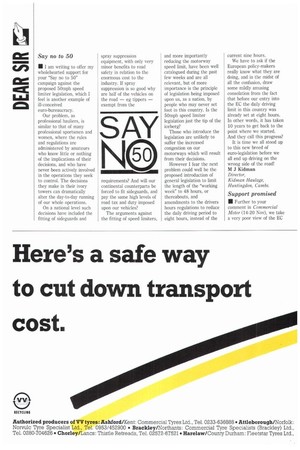Say no to 50
Page 50

If you've noticed an error in this article please click here to report it so we can fix it.
• I am writing to offer my wholehearted support for your "Say no to 50" campaign against the proposed 50mph speed limiter legislation, which I feel is another example of ill-conceived euro-bureaucracy.
Our problem, as professional hauliers, is similar to that of many professional sportsmen and women, where the rules and regulations are administered by amateurs who know little or nothing of the implications of their decisions, and who have never been actively involved in the operations they seek to control. The decisions they make in their ivory towers can dramatically alter the day-to-day running of our whole operations.
On a national level such decisions have included the fitting of sideguards and spray suppression equipment, with only very minor benefits to road safety in relation to the enormous cost to the industry. If spray suppression is so good why are half of the vehicles on the road — eg tippers — exempt from the requirements? And will our continental counterparts be forced to fit sideguards, and pay the same high levels of road tax and duty imposed upon our vehicles?
The arguments against the fitting of speed limiters, and more importantly reducing the motorway speed limit, have been well catalogued during the past few weeks and are all relevant, but of more importance is the principle of legislation being imposed upon us, as a nation, by people who may never set foot in this country. Is the 50mph speed limiter legislation just the tip of the iceberg?
Those who introduce the legislation are unlikely to suffer the increased congestion on our motorways which will result from their decisions.
However I fear the next problem could well be the proposed introduction of general legislation to limit the length of the "working week" to 48 hours, or thereabouts, and amendments to the drivers hours regulations to reduce the daily driving period to eight hours, instead of the current nine hours.
We have to ask if the European policy-makers really know what they are doing, and in the midst of all the confusion, draw some mildly amusing consolation from the fact that before our entry into the EC the daily driving limit in this country was already set at eight hours, In other words, it has taken 10 years to get back to the point where we started. And they call this progress?
It is time we all stood up to this new breed of euro-legislation before we all end up driving on the wrong side of the road!
M J Kidman
Director, Kidman Haulage, Huntingdon, Cambs.


























































































